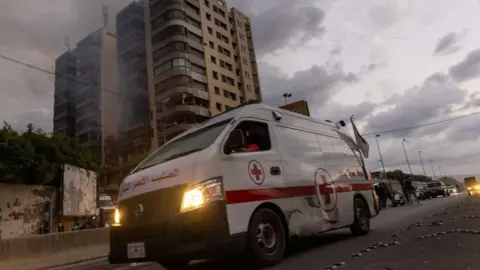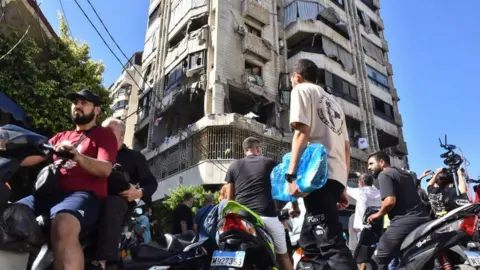'They have allowed this to occur, that they have not made Israel pay the cost for its crimes,' director of Palestine Solidarity Campaign tells Anadolu

'We've had sort of unprecedented, quite extraordinary pressure from the political establishment and from the police,' says Ben Jamal
'I think what's happening at the moment to the Palestinian people is unprecedented ... this is the first time in human history we have a genocide being live streamed,' Ben Jamal says
LONDON
Palestinians went through the "darkest moment" in the past 12 months in their enduring struggle for liberation, according to the head of Europe's largest Palestinian rights organization.
As a brutal Israeli offensive against the Gaza Strip reaches the one-year mark, deaths in the besieged Palestinian enclave have exceeded 41,000, mostly women and children, following a Hamas attack last October.
The UK was one of the first countries where large demonstrations were organized after the beginning of the onslaught as millions have marched around the country to demand a cease-fire and an arms embargo on Israel.
Various groups formed an alliance in Britain to mobilize millions of people, including the Palestine Solidarity Campaign (PSC), which is viewed as Europe's largest Palestinian rights organization, not only in the UK.
For PSC director Ben Jamal, the rallies are "unprecedented" in British history and there has not been a moment in British history since the suffragette movement in the early 20th century.
Jamal noted that one of the key things it has been saying since last October is that "history did not begin on Oct. 7."
"This genocide is built on the foundations of more than 76 years of oppression by the Israeli state of the Palestinian people through mechanisms of ethnic cleansing, colonization, military occupation and imposition of a system of apartheid," he told Anadolu.
Jamal stressed, however, that what has been happening in the past year is "undoubtedly the darkest moment" in Palestinians' enduring struggle for liberation.
"This is a moment of reflection. It's a moment of deep sorrow. It's a moment where we acknowledge the strength of the Palestinian people and their ongoing resilience,” he said. “But it's a moment of deep shame for our government, for the international community, that they have allowed this to occur, that they have not made Israel pay the cost for its crimes."
Asked how the group prepared for the mass mobilization of British citizens following the Oct. 7 attacks, Jamal said along with a coalition of five other groups, PSC spoke very quickly as they "knew what was coming."
"We knew that we needed to mobilize for an early demonstration, and we held a demonstration on Oct. 9. What we didn't know at that point, as I say, was how long would this go on for," he said.
A week or so after the surprise attack by Hamas against Israel last October, the first national march was held in London by the coalition, said Jamal, adding that they are holding the 20th march in London but some ask: "Why are they still marching?"
He said the answer to that question is “because the genocide is continuing, and because of our government's complicity, and also the complicity of companies, corporations, public bodies in the UK that invest in companies that are supporting the infrastructure of oppression and selling weapons to Israel."
He added: "That complicity continues. That's why so many people are continuing to march."
'Unprecedented, extraordinary pressure from political establishment'
There has been intense negotiation between the Metropolitan Police and pro-Palestinian groups about the times and length of the rallies in London.
In addition, the marches which were declared as overwhelmingly peaceful by many, were referred to as a "hate march" by some politicians, including former Home Secretary Suella Braverman.
"We've had sort of unprecedented, quite extraordinary pressure from the political establishment and from the police during this process," said Jamal.
He indicated that the political establishment was acting often as a "lobbyist for the Israeli government," and responding to pro-Israel voices from the very beginning in a bid to "stifle any solidarity with the Palestinian people."
They said that “these were marches of people who were supporting terrorism or were motivated by hatred of the Jewish people ignoring the fact that, from the very beginning there were thousands of Jewish people marching," he said.
Jewish groups attended the rallies since last October under the slogan: "Not in my name" and rejected the Israeli government's claim that attacks on Gaza are to ensure the safety of Jewish people.
"Despite this repressive environment, the rate of arrests of people on the marches have been tiny, less than an average music festival," reminded Jamal.
The marches and protesters faced numerous provocations by pro-Israelis during the past 12 months which is aimed at "trying to sustain establishment support for Israel's genocide," said Jamal. "We are here marching for truth, for the rights of the people under international law and calling for an end to mass slaughter. So, we know that history is on our side, and we ask people to stay focused on the reasons why we're marching.
Asked if he thought the coalition would mobilize so many people when they decided to organize the demonstrations last year, Jamal said the numbers have been extraordinary.
"If you said to me, you think a million will attend, I would have said I would have thought that was unlikely," he said. "I think what's happening at the moment to the Palestinian people is unprecedented in terms of this is the first time in human history we have a genocide being live streamed."
Israeli soldiers are taking film of what they are doing, and posting it, and people are seeing "scenes of utter horror," according to Jamal, who noted it awoke something in people.
"It's made them aware of the dynamics of the oppression. When they see Palestinian children with half of their heads missing or lying dead under the rubble, their response, as a human response, is to say: 'That could be my brother or my sister or my son or my daughter,' and they want it to stop," he said.
He noted that continuing the vast majority of arms sales to Israel by the British government, including fighter jet components, also played a role in bringing people into the protests.
"We didn't expect these numbers. I don't think we ever expected that this would have continued for a year, but I didn't expect that Israel would be allowed to continue with a genocide for a year," he noted. "And I think as long as those dynamics remain, people will continue to march."
Laura Kuenssberg
Presenter,
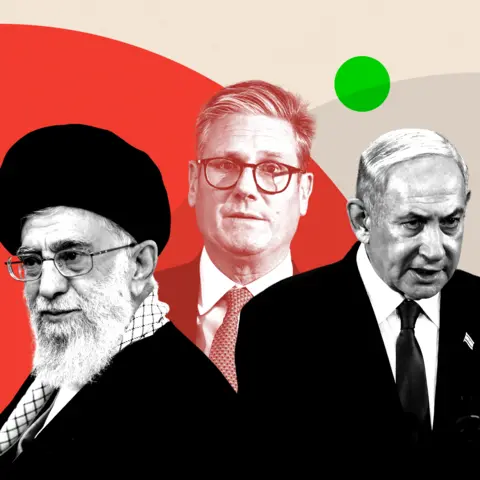
"Let’s be real, the war has started," a former minister tells me. "What happens in the Middle East never stays in the Middle East."
It’s hard not to be moved by the burning conflict – the killing of Israelis by Hamas almost a year ago and agony of the families of hostages snatched; the killing of thousands of Gazans by Israel in its response and the terrible suffering there.
And now Lebanon, where Israel has struck again after almost a year of cross-border hostilities, killing hundreds in air strikes against Hezbollah. Hundreds of thousands more civilians are on the move, desperate to find safety.
But it can feel bewildering, and far away. So why does it matter at home?
"There’s the humanitarian horror," says a former diplomat. And of course there are many families in the UK worried about the safety of friends or relatives still in Lebanon, Israel and Gaza. There is a potential bump in the number of refugees likely to head for Europe from Lebanon if all-out war begins.
The conflict has stirred tensions here as well. "We see it on our streets," the former minister says, whether that’s at Gaza protests, the rise in antisemitism or even a handful of pro-Palestinian politicians winning seats in Parliament.
If - as US President Joe Biden has acknowledged in public - Israel goes ahead and hits Iran’s oil industry, the costs could hit us all.
The price of oil jumped 5% after Biden’s remarks. Iran is the seventh biggest oil producer in the world. Just at a time when the world has been getting used to inflation cooling down, spiralling costs of energy could pump it right back up again and we’d all feel it.
One source suggested if the conflict keeps intensifying, "the Iranians might block the crucial Strait of Hormuz to show their power" which could, they suggest, "tip us into a 70s style crisis".
Around 20% of the world’s oil passes through the narrow channel of water. "It’s the pocket book effect," says another Whitehall source. The impact on the economy could be huge.
So what can the UK do about a hellishly complicated situation, especially with a new government that is still finding its feet? There’s the practical, the defence, and the diplomatic.

The Foreign Office has chartered three flights to get Brits who live in Lebanon home - and a fourth is scheduled to leave Beirut on Sunday. There are extra military staff in Cyprus ready to provide extra help if needs be.
The UK is deeply involved in providing humanitarian help in the region and Labour made the decision to start money flowing again to the UN organisation for Palestinian refugees on the ground, UNWRA, once it moved into power.
UK military back-up
The UK military was there as back-up to help Israel defend itself against Iranian missiles this week. RAF Typhoons were in the air on Tuesday night ready to support Israel’s own defences. Israel also had support from the US.
In the end, the UK and US didn’t fire any of their weapons. But back in April, RAF Typhoon jets based in Cyprus shot down Iranian drones.
Yet there are nerves in Labour circles about how far that role might go now in the coming weeks. One senior MP said: ‘‘We can be there to help defend Israel, we can be America’s mate, but we must not be there in any way, however small, in attacking Iran."
The UK is in what a former ambassador described as a "weird straddle". Ministers are urging Israel to hold back its attacks across Lebanon, just as through the last 12 months they have asked Britain's ally to stop pummelling Gaza. But at the same time, when called upon, helping Israel defend itself on specific occasions.
And even though some arms sales have been suspended, weapons continue to go.
Diplomatic opportunities
Then when it comes to the diplomacy, a former senior official tells me the UK is "thinking about the off ramps," - in other words, encouraging all the players, not just its allies, to think about how to bring the conflict to an end, and what a post-war settlement might look like.
The UK has specific opportunities - there are things that it can do that the US can’t, with an embassy still in the Iranian capital Tehran, for example, whereas the Americans haven’t had any formal diplomatic relations with Iran since 1980.
"Diplomacy is not only about talking to your friends," the former official says, suggesting the UK has a role to play in understanding Iran’s position and communicating it to others to ensure Israel and the US's decisions "aren't taken based on misunderstandings".
The specifics of the UK’s position have been used to diplomatic advantage before.
A former minister tells me when the families of hostages from Israel were in London, a meeting was brokered between them and the Qatari chief negotiator, an encounter that couldn’t have taken place elsewhere given the state of relations between their two countries.
Another source says that when it comes to Iran, the UK, "is not just a back-channel, we can be the front channel". Foreign Secretary David Lammy held a phone conversation with the Iranian foreign minister in August.
Limits - and high stakes
There is a limit to the influence that can be brought to bear, not just because of the realities in the region.
The UK’s voice is important, but not a deciding influence - "the only critical external player is the US," says one Whitehall source.
And fundamentally, perhaps the reality right now is that "no-one is scared of America any more," as one senior government figure suggests. Months of urging restraint have not brought an end to the conflict - anything but.
Whether politicians in the UK have the appetite for greater involvement is worth asking.
Foreign policy rarely yields rewards for politicians at home in the UK - and it can also feel like a distraction having to travel the globe while dealing with rows over free gifts and winter fuel payments. Sir Keir Starmer has found himself "spending more time on a plane than he ever expected," a senior MP suggests.
Diplomacy matters, whether its impact is easy to measure or not. A government insider suggests without the UK, US and Western allies urging restraint on a daily basis, there is a parallel universe where the conflicts might already have boiled over into a war far worse than anything we have seen so far. "Everybody has been working incredibly hard to try and prevent a spillover," a senior figure says.
The question this weekend is whether a terrible conflict that sucks in the US and other powers can yet be avoided. How Israel chooses to respond to Iran’s attacks may prove decisive.
A lot is at stake: a wider conflict could wreak havoc on our economy, on the stability of the world, and as well as the terrible toll on civilians caught up in wars not of their own making.
"Our best labour is diplomacy," a former minister says. The UK certainly cannot stop or solve this dangerous conundrum on its own. But the gravity of what is going on means that it has to try.


Top photo credit: Getty Images
BBC InDepth is the new home on the website and app for the best analysis and expertise from our top journalists. Under a distinctive new brand, we’ll bring you fresh perspectives that challenge assumptions, and deep reporting on the biggest issues to help you make sense of a complex world. And we’ll be showcasing thought-provoking content from across BBC Sounds and iPlayer too.
As the war grinds on, humanitarian groups say weaponisation of aid is ruining the lives and hopes of 2.3 million Palestinians
Anjana Sankar
October 05, 2024

Live updates: Follow the latest on Israel-Gaza
The Gaza war, which has dragged on for almost a year, has unleashed unprecedented death, destruction and mass displacement of the enclave's population.
What has turned this conflict into one of the most brutal of recent times is not only the scale of death and violence, but Israel’s ‘systematic obstruction’ of aid, international humanitarian agencies say.
Since the outbreak of hostilities on October 7, 2023 after militant group Hamas launched surprise attacks on Israel resulting in the deaths of more than 1,200 people and the kidnapping of 250, Gaza has borne the brunt of military retaliation.
The aerial bombardment and ground invasion have so far killed more than 41,700 people – mostly women and children – and destroyed two thirds of its infrastructure, including homes, schools, hospitals, even UN facilities.
For the 2.3 million people of Gaza, many of whom who were already dependent on humanitarian relief before the conflict, aid became the last straw in their battle for survival this past year.
Weaponisation of aid
But that critical supply of relief, international agencies say, has been systematically delayed, reduced, or outright denied to Gazans since the beginning of the war, a charge Israel vehemently denies. Prime Minister Benjamin Netanyahu says accusations of Israel limiting humanitarian aid were “outrageously false.”
“You can say anything – it doesn’t make it true,” he said in a press conference on Wednesday. But as the war drags on, Israel is continuing to manipulate aid, said the Norwegian Refugee Council.

Ahmed Bayram, communications adviser for the group, told The National the flow of aid into Gaza has "hit rock bottom", leaving more people facing starvation, disease and displacement. “The number of aid trucks going into Gaza is going down and down now, with an average of just 50 entering daily, far fewer than what is needed,” he said.
The UN independent investigator on the right to food, Michael Fakhri, has accused Israel of carrying out a “starvation campaign” against Palestinians. “Never in post-war history has a population been made to go hungry so quickly and so completely, as was the case for the 2.3 million Palestinians living in Gaza," he said this week.
A joint statement released by 15 international aid agencies said 83 per cent of the required food aid was not reaching the people as of September 2024. In August, more than one million people in southern and central Gaza did not receive any food rations, they added.
Medical supplies are also in need, with 65 per cent of the insulin required unavailable and half of the required blood supply undelivered, the statement read. This drastic reduction is having catastrophic consequences for the people of Gaza.
“There is no soap, no shampoo. Some of our colleagues are using rags instead of sanitary napkins,” said Ruth James, regional humanitarian co-ordinator for Oxfam, who is currently in Gaza. Even those with money can't lay their hands on many items, she added. “In all of the south of Gaza, there is only one ATM that is functioning,” she said.
Collective punishment
Israel’s siege of Gaza and obstruction of aid represent what the UN has called “collective punishment”.
On October 9, 2023, two days after the Hamas attack, Israel’s Defence Minister Yoav Gallant announced a complete siege on Gaza. "There will be no electricity, no food, no fuel, everything is closed,” he said.
In the place of 500 aid and commercial lorries that were entering Gaza daily before the conflict began, the number by 75 per cent, according to aid groups. Fuel shortages also dipped to critical levels, with a huge gap between the estimated daily need of 400,000 litres for humanitarian purposes and fewer than 100,000 that is actually arriving.
As Israeli tanks pushed deeper into the northern parts of Gaza supported by a massive aerial bombing campaign, more than a million people were asked to move south. This first wave of mass displacement further squeezed humanitarian aid.
Mohammed Sadiq, a resident of Gaza city, said his children went without proper food for weeks after they moved southwards last October.
"You have to be lucky to find some bread or canned beans. There were long queues to get a small cup of soup. I had to see my children fall asleep on half-empty stomachs," Mr Sadiq told The National.
Aid agencies were faced with another challenge – a communication blockade when Israel cut off telephone and internet connections in Gaza. Louise Watergate, spokeswoman for the agency for Palestinian refugees (UNRWA) told The National that the first 10 weeks of war "was utter chaos".
“We were in a situation where we could not even get in touch with our own colleagues on the ground,” she said.
Hunger and disease spread rapidly across the Gaza Strip within the first three months of the war, with the UN's Office for Co-ordination of Humanitarian Aid (Ocha) declaring in December that only 10 per cent of Gaza’s food needs were met in the first 70 days.
In a report issued in December, Human Rights Watch accused Israel of using starvation as a method of warfare by deliberately blocking the delivery of food, water and fuel into Gaza. The organisation warned this practice constituted a war crime under international law.
UN experts had warned about an impending famine in Gaza as early as May. Later in June, the findings from the Integrated Food Security Phase Classification (IPC) analysis, conducted from May 27 to June 4, said about 495,000 people – 22 per cent of the population – were experiencing the highest level of starvation, known as IPC Phase 5.
The report said about 2.1 million people, or 96 per cent of the population, would face high levels of acute food insecurity through to September.
UN experts later declared famine had spread across much of Gaza, particularly in the north, where Israel had focused much of its military campaign. On June 22, the government media office reported at least 34 children had already died of malnutrition.
The impact on health care has also been devastating, with Israel’s siege of hospitals, and detention of doctors and medical workers. By January, more than 600 healthcare workers had been killed, the World Health Organisation said, and 94 medical facilities had come under attack, including 26 hospitals and 79 ambulances.
Hunger when aid is plentiful
The biggest irony of the hunger crisis in Gaza is that Israel and the UN agencies agree there is enough aid to feed the population. But they disagree on whether it is reaching the people.
Israel's Co-ordinator of Government Activities in the Territories (Cogat) claims there is no famine in Gaza.
"One million tonnes of aid entered Gaza since the start of the war, 70 per cent was food," Cogat said last week in a post on X. The agency claims more than 3,000 calories per day per person has entered Gaza since January, citing an independent academic study.

"Over 53,989 trucks containing approximately 1,058,804 tonnes of humanitarian aid, including more than 819,943 tonnes of food and 51,350 tonnes of water, have been delivered to the Gaza Strip," a Cogat spokesman told The National.
He also claimed only 498 of 53,000 aid lorries had been denied entry due to containing dual-use items that require specific security evaluation to prevent their exploitation by Hamas for military purposes.
The spokesman said Israel has worked to expand routes through which aid can enter Gaza, including extending working hours of Kerem Shalom and the opening of new crossings such as Erez East, Erez West and Crossing 96.
Despite mounting international pressure and criticism, Israel argues the delays and shortages in aid distribution are the result of logistical failures on the part of the UN and other organisations, not a deliberate policy.
However, these claims have been disputed by numerous NGOs and aid agencies on the ground, which cite harsh inspections, restrictions on goods and exhaustively long delays in getting permits as a major obstacle to the smooth flow of aid.
Ruth James, Oxfam's regional humanitarian co-ordinator, told The National that lorries laden with food, water and medicine often sit for days at Israeli checkpoints, awaiting clearance that sometimes never comes. The process is fraught with rejection and delay, she said.
“Even basic items such as chlorine for water purification and bandages or scissors for hospitals have been held up or denied entry,” she said.
Ms Watergate of UNRWA said her colleagues are forced to "constantly reinvent humanitarian response" on a day-to-day or weekly basis due to the constant displacement of people, the access restrictions and the changing security situation on the ground.
She said the turning point for humanitarian distribution was the closure of southern Rafah crossing point on May 6 that disrupted the "rhythm and routine" of aid flowing in.
"After Rafah was closed, aid agencies had to relocate to the middle areas. We had to move hospitals, solar panels, generators and warehouses."
The collapse of law and order in the north, and the increase in looting of lorries in the north, where Israel dismantled the existing security apparatus, also dealt a severe blow to the humanitarian response, she said.
Israel's chokehold on aid supply
Israel tightly controls entry and exit from Gaza by land, air and sea, meaning aid cannot enter without its approval. Lorries that enter through Kerem Shalom are checked at the southern border crossing before being driven to Rafah city, where distribution is organised.
Lorries entering through the Rafah crossing are first scanned at Nitzana in Israel and then sent back over to Al Owga in Egypt and driving to Rafah before entering Gaza.
Most aid has been entering by lorries arriving from Egyptian territory through Kerem Shalom, since Israel shut the Rafah border crossing, the only land route to cross from Egypt to Gaza, in early May.
The floating pier built by the US in May to increase the flow of humanitarian aid into Gaza was short-lived and was dismantled several times before being scrapped permanently in July, leaving the land crossing as the most viable form for aid entry.
Cogat said private groups are moving their supplies into Gaza from the Erez crossing, also known as Beit Hanoun, in the north, that connects the enclave to the occupied West Bank.
As the conflict drags on, agencies have expressed deep frustration over the failure of diplomacy to secure the unimpeded delivery of humanitarian aid.
"The biggest disappointment over the last year is that diplomacy has failed the people of Gaza," said Mr Bayram of the Norwegian Refugee Council. "If the big powers were serious about helping, they would have put more pressure on Israel to allow the free flow of aid."
Political analysts and humanitarian workers alike agree that without a ceasefire and a comprehensive peace agreement, the crisis will only deepen. With Israel expanding its military campaign into southern Gaza, and with the conflict threatening to spill over into Lebanon and Iran, hopes for a ceasefire are growing dim.
Meanwhile, as winter approaches, aid agencies are scrambling to provide shelter for the more than one million people who have been displaced numerous times. "We’re preparing for a harsh winter and shelters are desperately needed," said Ms Watergate. "But at the rate we’re going, with the level of supply we’re able to move, it could take years to meet those needs."
Despite the overwhelming scale of the crisis, aid agencies say they remain steadfast in their efforts to reach the people of Gaza. “We have the people, we have the resources, we have the means. It is the restrictions that are stopping us,” said Ms James.
“We need to see the political will in removing the restrictions and allowing unimpeded aid into Gaza," she said. Twelve months into the war, as Gaza is teetering on the brink of collapse, people will continue to suffer, with no end in sight if free flow of aid is not restored, she said.
Portraits of people who were taken hostage or killed in the Hamas attack on the Supernova music festival on 7 October. (Getty)
At around 7.40am on 7 October 2023, hundreds of Hamas gunmen crossed the border from Gaza into Israel, launching an unprecedented and devastating attack on Israeli territory. Catching their long-time enemies off-guard, around 1,200 people (including 600 civilians) were killed and 250 taken hostage. A year later the consequences are still being played out as the region teeters on the brink of all-out war.
The coordinated attack - which also involved several other Palestinian militant groups - had been months in the planning and began with a major rocket barrage. Soon after, militants breached the Gaza barrier and attacked numerous communities in the south of Israel.
The site of the biggest bloodshed was the Re'im music festival, around three miles from the border, where 364 people were massacred. Elsewhere, more than 100 people were killed at Kibbutz Be’eri.
The attack by Hamas, a proscribed terrorist group in the UK since 2001, sparked international condemnation and Israeli prime minister Benjamin Netanyahu declared his country was in a state of war.
Within hours, the gunfire had turned back to Gaza with Israel launching a relentless bombardment on the Gaza Strip and gearing up for a planned invasion of the territory.
Since then, Israel has attacked all corners of the strip from ground and air and claims to have dismantled much of Hamas's power. Although many of the figures around how many people have been killed in Gaza since the outbreak are disputed, analysts believe over 40,000 Palestinians have died.
Palestinian children play on the site of a destroyed building, purportedly where Israeli hostages were held and rescued during an Israeli military operation in June. (Getty)
Despite enormous international diplomatic efforts, the war has not stopped and, instead, continues to escalate.
Fears of it spilling into a regional conflict have become a reality as the Houthis in Yemen began striking international shipping in response to Israel's attacks on Palestinians and, even more seriously, the growing conflict in Lebanon.
Following the 7 October attack, the Iran-backed militant group Hezbollah, which is based in Lebanon, began firing rockets into northern Israel, forcing the evacuation of several communities. In recent weeks, Israel has increasingly redirected its forces to the north and launched several attacks on Hezbollah, most notably killing its long-time leader Hassan Nasrallah in a strike on Beirut.
On 1 October, in the latest escalation, Israel launched a "targeted" ground invasion of southern Lebanon and also stepped up its aerial bombardment; a day later, Iran retaliated with its own barrage of missile strikes.
As the world hold's its collective breath, Yahoo News runs down to the key moments in the past year that have brought the world to the edge of even greater catastrophe.
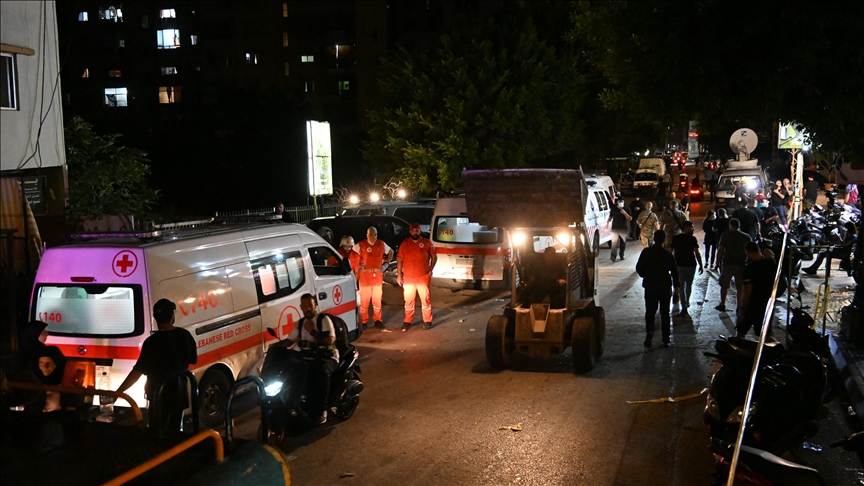




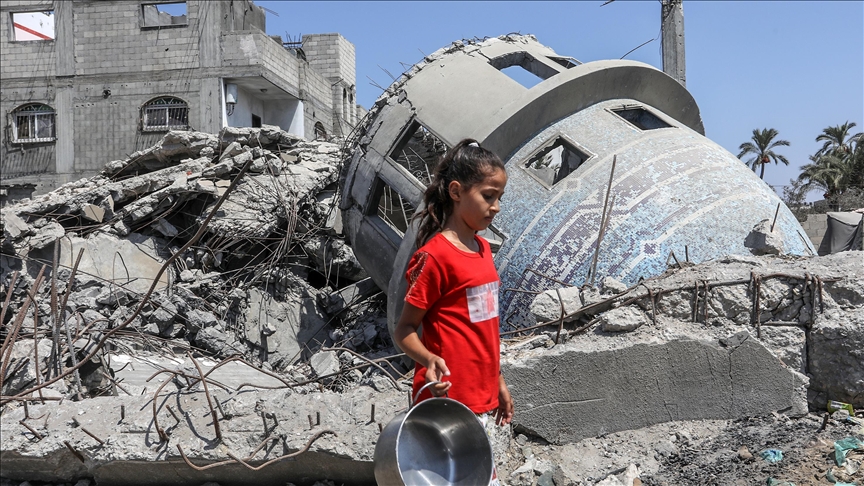


 A Syrians hold the symbolic keys as they protest against the Israeli military operation in Lebanon in October 2024. (Photo: Getty Images)
A Syrians hold the symbolic keys as they protest against the Israeli military operation in Lebanon in October 2024. (Photo: Getty Images)
 An Israeli woman with her hands painted red, denoting blood, takes part in a protest against the Israeli government in Tel Aviv in July 2024. (Image: AFP)
An Israeli woman with her hands painted red, denoting blood, takes part in a protest against the Israeli government in Tel Aviv in July 2024. (Image: AFP)
 A protestor in Paris wearing a red-stained trouser, denoting blood, to "denounce the silence of international and feminist organisations" on rapes committed by Hamas during the October 7 attack on Israel. (Image: AFP)
A protestor in Paris wearing a red-stained trouser, denoting blood, to "denounce the silence of international and feminist organisations" on rapes committed by Hamas during the October 7 attack on Israel. (Image: AFP)

